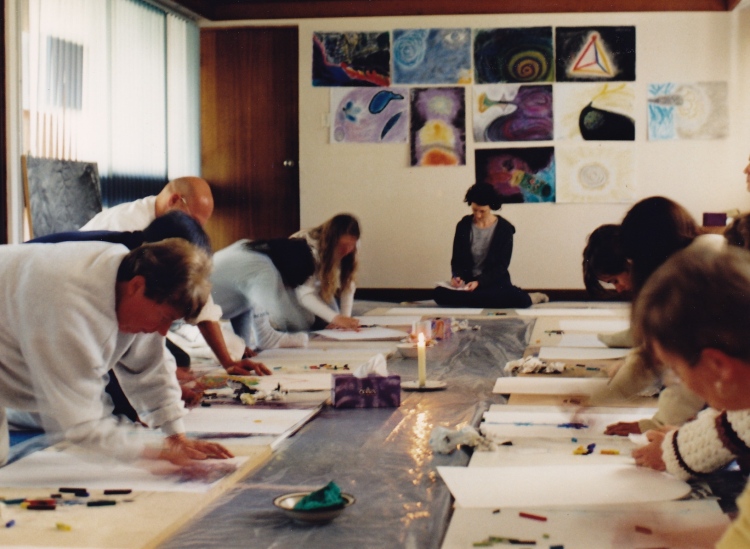
Janis Lander: Vision Art Workshop – ‘Observing the energy body (centres and channels)/Observing thoughts and emotions/Understanding the dynamic interaction of colours and “sacred geometry” in the making of an image’
Schiller was confident that men in the contemporary world could develop new types of harmony and new types of community predicated upon new connections between the powers of the mind. This could not, however, be developed by ignoring the enormous changes which had overtaken society since the decline of the Greek city state. Schiller saw the long-term solution to the problem in terms of a programme of aesthetic education which, by uniting facets of personal experience, would lead eventually to the development of harmonious social experience. Schiller’s typology of human development was, in a sense, therefore, triadic. It presupposed at the beginning of the historical world an undifferentiated society peopled by whole men whose capacities and powers had not been fragmented by the division of labour – such a society reached its zenith with the Greeks and has since declined as a result of the growth of science and the division of labour. These factors had led to the fragmentation of the community and of the person. The third stage of this process, which has yet to arrive in Schiller’s view, was to be induced by aesthetic education, which would procure a regeneration of both the community and the individual personality appropriate to this change in the human condition.
Raymond Plant, Hegel, An Introduction, Basil Blackwell, Oxford, 1983, 74
Part three/to be continued…

Morning Phil. Unfortunately, from my angle, Schiller’s solution is still nothing more than treatment of symptoms, as opposed to addressing the core problem, which is the irreversible decline of society forms based on some form of individualism. I see the Greek city state as one of history’s greatest tragedies, responsible for annihilating the progress of individuals, ultimately sacrificed on the altars of an urban, forced coexistence, with pragmatism as the only means for survival.
I’m not against any form of true progress, as long as it’s not meant to be a deliberately ignorant diversion from solving the poverty and degradation rotting around. We’re doing the same today: boasting achievements in sciences and arts, ignoring the slums such ways of thinking created. Generous patrons of endeavours of beauty, prove to be ruthless slave owners and wage thieves…
We compete in Olympics, yet starving Ethiopian children have never heard of their athletes…
Yes, I would subscribe to Schiller’s, should his solutions be more than gold foil good to make cancerous tumours more presentable.
And once arrived to this stage of understanding reality, what shall such an individual do? Donate a monthly amount to save the endangered Siberian tigers? Yes, that seems easier than speaking about stripping all WWII German and collaborationist officers of their hefty state pensions and perks…
Aesthetic education did and does no more than elevates perception so high, as to not even notice the ugly reality lurking below.
LikeLike
Hello Moshe, you have responded powerfully to why I made this post. A capitalist society is one based on, one which requires division – for the purpose of exploitation – both within a society and, as you exemplified, beyond it. To attempt to develop a creative and spiritual (which concept, for me, implies a profound and multi-layered connectedness to the world) community on this basis could only ever serve an ideological purpose. Phil
LikeLike
Thank you Phil, you’re generous. I read Engels’ Condition of Working Class in England while I was about 11-12 years old, and it sort of “conditioned” my thinking forever, even if at the time, Ceausescu’s Romania was living it’s utopian daydream. I understood at a raw level the striking dichotomy between ideology and and its effects on society, but it took a journey through reality to comprehend truths beyond questionability. I’m glad to finally have met someone mature enough to think beyond pragmatic ends.
LikeLike
Thank you, Moshe
LikeLike